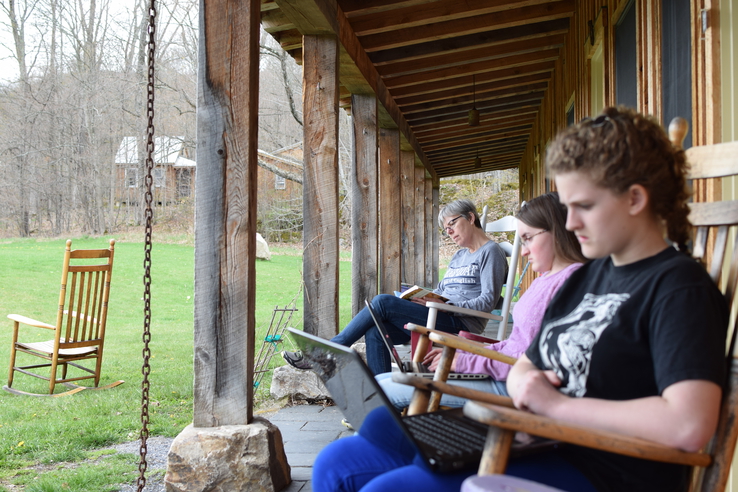
#2: Changing my Perspetive
For around half a year now, I have been interested in animal cruelty. I started to become more aware of where my products came from, aligning my purchasing habits with my beliefs about how animals should be treated. Along with that, I also do not eat meat, for the reason that I don’t support the meat industry and I interviewed three people that I am close with, wondering what their perspectives on these issues were.
The first person that I interviewed was my friend Emily. She is also a vegetarian. She is aware of how many cosmetic companies test on animals. She only buys cruelty-free products. If a product may not have safe ingredients and is necessary to test on an animal to make sure it is okay, why should we be using it in the first place? She also mentioned how Hitler based his ideas of concentration camps off of the way animals are treated in slaughterhouses. I thought that this was a very interesting point and shows that the longest and most disregarded genocide is that of animals.
The next person that I interviewed was my teacher Kate Stauss. She was my English teacher last year, and we have kept in frequent touch since. She and her husband raise their own beef, chicken, and eggs. She does this because she has seen cruelty in farms around her. They treat the animals horribly, force-feeding them so they get fatter. Cows are supposed to eat grass, and grain is not good for their intestines, so treating them like this is cruel. People are selfish and raise the livestock like this for personal gain, so the meat has more fat and tastes better. When the time comes to slaughter the animal, many farms do it in a very brutal way, most of the time decapitating them. Kate and her husband try to slaughter the animals in the least harmful way they can when it comes time. To change this industry, she thinks that if people were aware of how horrible this industry was, people may stop supporting it. She’s in luck, because in What’s the Story? we are here to spread awareness about important social issues!
The last person I interviewed was my best friend Maggie. She understands that lots of animals get abused by either their owners or in zoos. In the food industry, animals are often kept in extremely small spaces and get fed food that is not fitting to their natural eating habits. The animals are treated unjustly, being in a space that is not cleaned and never seeing the sun. These do not align with her beliefs, and she does not support either industry. She only eats grass-fed beef and free-range chicken and does not buy products that are tested on animals.
The thing that I learned most from this is how there are bright spots in this cruel industry. If we can raise awareness to the ways that these animals are so horribly treated, people can become more aware of their buying habits in the grocery store and when buying any kind of cosmetic, whether that be makeup or face lotion. And while it is next to impossible to stop the meat and dairy industries around the world, along with the industry that tests on animals, couldn’t we first focus on the bright spots to make the path to a less abusive world a little more clear?
 Previous Post
Previous Post Next Post
Next Post







I wonder Riley if there is a way of you proposing a system where slaughter houses could be less cruel/farms using less cruel tactics on animals that would be money efficient. I think a central cause in the meat industry and how our animals are raised are a matter of money and time, and it is a hard change when an entire economy relies on these inhumane “fast and efficient” ways of getting animals to be ready for slaughter houses. I totally agree with you that the focus on our meat industry should be based on more comfortable ways for animals upon feeding and slaughtering, as that is the right thing to do. Keep up the good work! 🙂 Kiara
Hey Riley,
So much cool thinking happening here! It really got me thinking, too. Was there a particular moment six months ago where your awareness about this issue began?
A few questions came immediately to mind…
Do you know much about the work of Temple Grandin? She could be really interesting to read up on in terms of her work on designing a more humane slaughtering system. How do other countries manage animal testing and meat/dairy production? Is the US unusual in pumping its livestock full of antibiotics and hormones? (And herbicides and pesticides, for that matter…I read an interesting bit in The New York Times a few weeks ago about how Ben and Jerry’s tested very high for certain pesticides – absorbed by cows eating treated vegetation and passed through their milk into our pints of cookie dough!) The zoo piece is really interesting, too – obviously, there are a lot of different zoos and management styles out there, and it makes me think about whether animals in zoos are in a way sacrificed for the greater good of their species. If someone in the US sees an elephant at a zoo, does it raise their awareness of this animal’s need for protection in the wild?
I like how you’ve focused in on the importance of these bright spots in a pretty grim industry; exploring where change is happening is a key piece of all this.
I’m looking forward to seeing your thinking evolve…thanks for writing.
Cheers,
Annie
Hey Riley,
I totally love your topic I lament the way the animals are treated in the meat industry. It seems like you really are passionate about this topic and already know a lot. I did not know that Hitler based the concentration camps on slaughter houses, that’s terrifying. I am curious though about some of the things that you said in your post. I would really like for you to elaborate on the actual slaughter of the animals because from where I’m sitting if I’m going to be killed decapitation sounds like the quickest most painless way possible. Perhaps it is different for animal? Either way I look forward to see how you continue research in the future, and I would love to talk to you about farm animals lack of place in the ecosystem and the environmental impact of potentially shutting down the meat industry.
Hi Riley!
It seems like your idea is already coming together really well, and you have a specific issue to focus on. This definitely seems like an issue that can only benefit from increased awareness and information. This issue is especially relevant in a state like vermont that has been so reliant on the beef and dairy industries for so long. I’m interested to see where you go next with this.